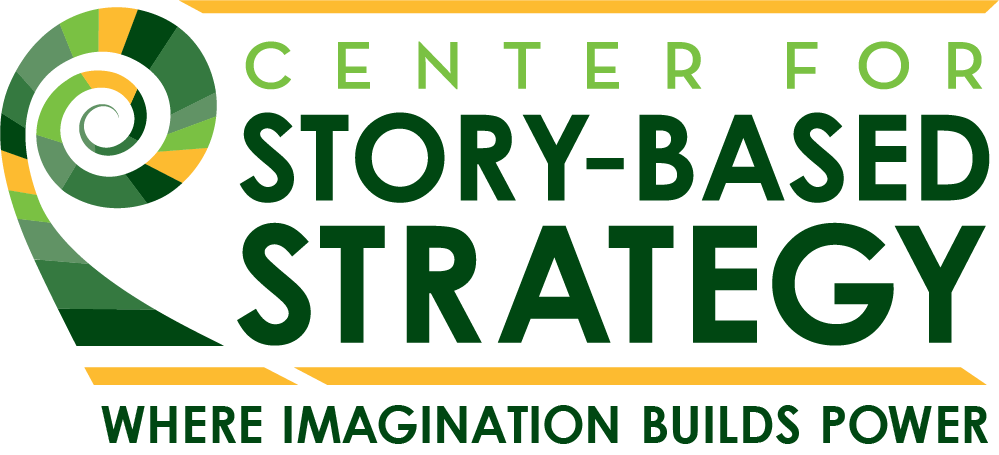Genocide at the table
Patrick Reinsborough, CSS Executive Director
This week the United States will mark its annual celebration of one of its most cherished origin stories: so-called Thanksgiving. What can we learn about the way narrative power operates by examining this powerful and destructive narrative?
The official Thanksgiving story is a snapshot of rosy relations between European colonizers and the native peoples of the Americas that emphasizes cooperation, peace, and the native peoples welcoming the Pilgrims. We are all familiar with the story: the Pilgrims are the new kids on the block who have just shown up on this continent. Their new friends the local indigenous people (usually left generically referred to as Native Americans or with the character of Squanto as a place holder) show them the ropes by teaching them to plant corn and hunt the local wildlife. Together they have a big party and everyone lives happily ever after.
However, as many of us know, that was not the reality. In fact, the first historical record of colonists celebrating a “thanksgiving” is not related to a harvest festival or to the idea of cross-cultural cooperation, but to a celebration of a massacre of over 700 Pequot women and children in 1637. The late November date (which is 6 to 8 weeks after harvest in New England) appears to commemorate the anniversary of the massacre, which was celebrated by the Europeans as a great military victory. For more gruesome details on the history of Thanksgiving see the Bureau of White Affairs
The Thanksgiving story reveals key aspects of a narrative power analysis. First, that dominant stories in the culture—ones that are widely accepted as true—are often worth examining to understand what they really say and what they leave out, as well as the underlying assumptions that allow them to operate. In this case, one underlying assumption is that Europeans were a peaceful and welcome presence in the Americas.
Second, this example shows that power shapes point of view. Clearly the story of Thanksgiving that has been passed on in the dominant culture is from the perspective of the Pilgrims, and not the native peoples. As the famous saying goes, “History is written by the winners.”
Third, the Thanksgiving story has universalized the Pilgrims’ perspective as the only truth and has normalized their experience. This universalization masks the realities of the genocide of native peoples, and the mythology continues to uphold white privilege today. This is what at CSS we refer to as a control mythology because it offers an explanation for current power relationships that makes the status quo seem inevitable and unchangeable.
However the control mythology of Thanksgiving is both challengeable and changeable. Since 1970 Native American activists and allies have marked Thanksgiving as the “National Day of Mourning” to draw attention to the genocide of native peoples and their ongoing struggles against racism and colonization. A group called the United American Indians of New England organizes an annual demonstration at Plymouth Rock in Massachusetts. LINK: United American Indians of New England: http://www.uaine.org. In recent years, through grassroots and legal pressure, they have even won several commemorative plaques acknowledging the Day of Mourning and native historical figures.
Increasingly more and more non-native allies are joining native people in challenging this control mythology and using the moment to have a more honest conversation about American history and the ongoing resistance of Native peoples to genocide. If we want to build a just, sustainable future that acknowledges the humanity of all peoples and cultures we need to start by ending the denial about our past.
The antiracist, feminist group White Noise collective has compiled a list of great articles, videos and other resources to challenge the Thanksgiving control mythology
Support ongoing indigenous struggles for self-determination, environmental justice and a better future for all peoples. Here’s just a few of the organizations that could use your political and financial support:
Indigenous Environmental Network
American Indian Movement
Idle No More
National Coalition on Sports & Racism


